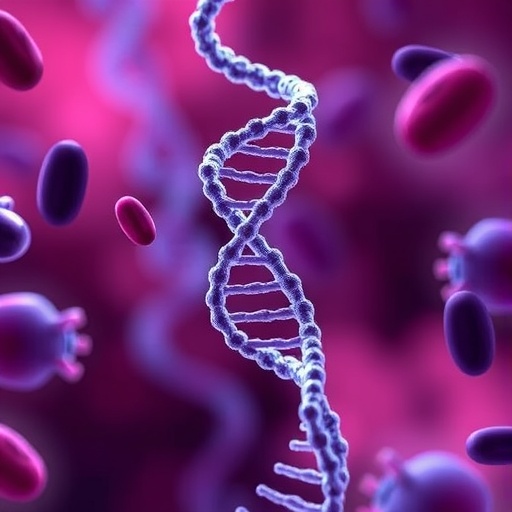In a groundbreaking study conducted by Australian scientists, a pivotal discovery has been made that could revolutionize the therapeutic landscape for blood cancers. They identified a singular mutation within the DNA sequence coding for the enzyme DNA methyltransferase 3A (DNMT3A) that disrupts critical tumor-suppressing pathways. This research paves the way for novel targeted treatments that specifically address this mutation, which is notably prevalent in certain aggressive blood cancers such as acute myeloid leukemia (AML).
DNMT3A plays an essential role in the epigenetic regulation of gene expression through DNA methylation, a process where methyl groups are added to the DNA molecule. This methylation process acts as a molecular switch to toggle genes on or off, thus controlling cellular functions and maintaining genomic integrity. Mutations within DNMT3A impair its methylation capability, triggering a domino effect that ultimately compromises the cell’s regulatory machinery. The failure in this system allows aberrant cellular processes to flourish, potentially leading to malignancies.
The mutation in DNMT3A is among the most frequently detected genetic alterations in blood cancer patients. Approximately 20 to 25 percent of adults diagnosed with AML carry this mutation, underscoring its clinical significance. AML itself is a rapidly progressing disease characterized by the unchecked proliferation of immature blood cells in the bone marrow, leading to systemic complications. Despite advances in diagnosis and treatment, AML remains stubbornly difficult to cure, necessitating deeper molecular insights to foster therapeutic innovation.
This impaired methylation leads to widespread dysregulation in cellular signaling pathways. One such critical pathway affected is the p53 tumor-suppressor pathway, renowned for its role in detecting and repairing DNA damage. Cells with the DNMT3A mutation exhibit diminished p53 activity, reducing their capacity to respond to genotoxic stress effectively. This attenuation fosters an environment where damaged DNA accumulates, heightening the probability of further oncogenic mutations and malignant transformation.
Dr. Erin Lawrence, co-lead author of the study, emphasized the implications of this finding, stating, “Cells carrying DNMT3A mutations are less adept at managing stress and repairing DNA damage. The silencing of the p53 pathway in these cells significantly predisposes them to acquire additional mutations that can drive cancer progression.” This mechanistic insight clarifies how a single nucleotide change can propagate extensive downstream effects that culminate in tumorigenesis.
The conventional challenges associated with targeting enzyme mutations in cancer are daunting; however, this work leverages CRISPR-Cas9 gene-editing technology to replicate the exact point mutation in DNMT3A observed in patients. Amali Cooray, co-lead author and PhD candidate, explained that even a minuscule alteration — a single base pair change — in the DNA can have significant, cascading impacts on cellular function. This precision modeling offers a robust platform for elucidating mutation-specific pathologies and testing potential interventions.
Importantly, not every individual bearing the DNMT3A mutation progresses to develop cancer. Epidemiological data highlight that 10 to 20 percent of older adults, particularly those above 60 or 70 years, carry this mutation without manifesting disease. This suggests that the mutation alone is insufficient to cause malignancy and that other genetic, environmental, or epigenetic factors likely contribute to the full oncogenic process.
The translational aspect of this research lies in its potential to inform therapeutic development. Currently, no targeted treatments exist for cancers bearing DNMT3A mutations, representing a significant unmet clinical need. AML treatments remain largely non-specific, often associated with severe side effects and limited efficacy. By decoding the molecular underpinnings of DNMT3A-mutant cancers, researchers hope to design drugs that can restore normal methylation patterns or reactivate silenced tumor suppressor pathways like p53.
Professor Marco Herold, ONJCRI’s CEO and senior author of the study, reflects on the broader impact of their discovery, stating, “Understanding the precise molecular events driving DNMT3A-mutant blood cancers enhances our capacity to design more effective and tolerable therapies. This knowledge could translate into real-world benefits for patients battling these challenging diseases.” This insight sets the stage for a more personalized medicine approach that tailors interventions to specific genetic profiles.
The prevalence and severity of AML underscore the urgency to innovate treatment strategies. With nearly 150,000 individuals worldwide living with AML as of 2021, the public health burden is substantial. Advances such as this study provide a glimmer of hope for improving patient outcomes by moving beyond generic chemotherapy toward targeted molecular therapies based on individual genetic alterations.
The collaborative efforts and funding supporting this research reflect the global commitment to cancer innovation. Contributions from the National Health and Medical Research Council (NHMRC), Australian Rotary Health, WEHI, Phenomics Australia, and government initiatives demonstrate the multidisciplinary approach required to tackle complex diseases like cancer. This synergy between technology, basic science, and clinical research is vital for translating laboratory discoveries into successful treatments.
As this research continues to evolve, the scientific community is optimistic about the implications for blood cancer diagnostics and therapeutics. Through deep molecular understanding and advanced genetic engineering, targeting DNA methyltransferase mutations may soon shift from a theoretical possibility to a clinical reality, offering renewed hope to patients worldwide.
Subject of Research: Cells
Article Title: A Single DNMT3A Mutation Disrupts Tumor Suppression in Blood Cancer
News Publication Date: 30-Apr-2025
Web References: 10.1038/s44319-025-00450-4
Keywords: Blood cancer
Tags: aggressive blood cancers researchblood cancer risk factorsclinical significance of DNMT3A mutationDNA mutation in blood cancerDNMT3A enzyme role in leukemiaepigenetic regulation and gene expressiongenetic alterations in blood malignanciesmethylation process in cancertargeted treatments for acute myeloid leukemiatherapeutic advancements in leukemiatumor-suppressing pathways disruptionunderstanding AML mutation prevalence





